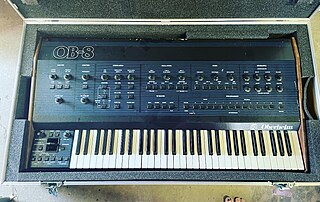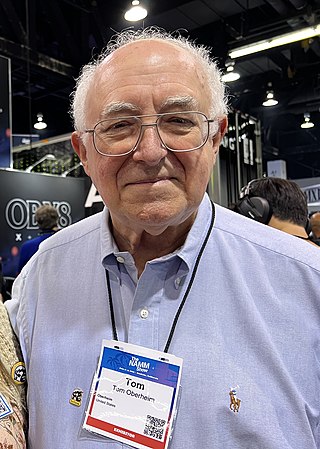
Roland Corporation is a Japanese multinational manufacturer of electronic musical instruments, electronic equipment, and software. It was founded by Ikutaro Kakehashi in Osaka on 18 April 1972. In 2005, its headquarters relocated to Hamamatsu in Shizuoka Prefecture. It has factories in Malaysia, Taiwan, Japan, and the United States. As of December 2022, it employed 2,783 people. In 2014, it was subject to a management buyout by its CEO, Junichi Miki, supported by Taiyo Pacific Partners.

Oberheim is an American synthesizer manufacturer founded in 1969 by Tom Oberheim.

Moog Music Inc. is an American synthesizer company based in Asheville, North Carolina. It was founded in 1953 as R. A. Moog Co. by Robert Moog and his father and was renamed Moog Music in 1972. Its early instruments included the Moog synthesizer, followed by the Minimoog in 1970, both of which were highly influential electronic instruments.

The Oberheim Polyphonic Synthesizer is a series of analog music synthesizers that was produced from 1975 to 1979 by Oberheim Electronics. Developed by Tom Oberheim, they were the first production synthesizers capable of playing chords.

The ARP 2600 is a subtractive synthesizer first produced by ARP Instruments, Inc in 1971.
Alesis is an American company that designs and markets electronic musical instruments, audio processors, mixers, amplifiers, audio interfaces, recording equipment, drum machines, professional audio, and electronic percussion products. Based in Cumberland, Rhode Island, Alesis is an inMusic Brands company.
Arturia is a French electronics company founded in 1999 and based in Grenoble, France. The company designs and manufactures audio interfaces and electronic musical instruments, including software synthesizers, drum machines, analog synthesizers, digital synthesizers, MIDI controllers, sequencers, and mobile apps.

The Prophet-5 is an analog synthesizer manufactured by the American company Sequential. It was designed by Dave Smith and John Bowen in 1977. It was the first polyphonic synthesizer with fully programmable memory.

Donald Buchla was an American pioneer in the field of sound synthesis. Buchla popularized the "West Coast" style of synthesis. He was co-inventor of the voltage controlled modular synthesizer along with Robert Moog, the two working independently in the early 1960s.
Polyphony is a property of musical instruments that means that they can play multiple independent melody lines simultaneously. Instruments featuring polyphony are said to be polyphonic. Instruments that are not capable of polyphony are monophonic or paraphonic.

Generalmusic was an Italian musical instrument manufacturing company focusing on digital and acoustic pianos, synthesizers and music workstations. The company produced three lines: a musical instrument series called GEM, a various studio equipment series called LEM and electric organs/synthesizers called ELKA. It was founded in 1987 and ceased business in 2009 before becoming bankrupt in 2011.

The Oberheim OB-8 is a subtractive analog synthesizer launched by Oberheim in early 1983 and discontinued in 1985. As the fourth product in the OB-series of polyphonic compact synthesizers, the OB-8 was the successor to the OB-Xa. The number of production was about 3,000 units.

The Oberheim OB-Xa was the second of Oberheim's OB-series polyphonic analog subtractive synthesizers, replacing the OB-X with updated features.

Thomas Elroy Oberheim, known as Tom Oberheim, is an American audio engineer and electronics engineer best known for designing effects processors, analog synthesizers, sequencers, and drum machines. He has been the founder of four audio electronics companies, most notably Oberheim Electronics. He was also a key figure in the development and adoption of the MIDI standard. He is also a trained physicist.
Viscount International SpA (Viscount) is a musical instrument manufacturer based in Mondaino, Italy. The brand Viscount was registered in 1969 by Marcello Galanti, but the company was established in the late 19th century by his forefather Antonio Galanti. After 1969 Viscount's primary focus has been on classic organs and digital pianos. Several alternative brands were formed in the 2000s to aim at expanding into other markets: VERSE and Voice Systems, respectively, for the high and low-end Pro-Audio markets and Physis for digital organs using Viscount's physical modeling technology. The company also used the Oberheim brand for several years, to market vintage organs, synthesizers and guitar effects. Currently, Viscount's manufacturing and R&D activity is based in Italy. The company has been continuously owned by the Galanti family since its inception.

The Prophet '08 is a polyphonic analog synthesizer released by Dave Smith Instruments (DSI) in 2007. As with DSI's other instruments, the Prophet '08 uses analog subtractive synthesis. Similar in functionality to the renowned Sequential Circuits Prophet-5 popularized in the 1970s, the Prophet '08 has an all analog signal path; however its envelopes are generated digitally.

E-mu Systems was a software synthesizer, audio interface, MIDI interface, and MIDI keyboard manufacturer. Founded in 1971 as a synthesizer maker, E-mu was a pioneer in samplers, sample-based drum machines and low-cost digital sampling music workstations.

Gibson, Inc. is an American manufacturer of guitars, other musical instruments, and professional audio equipment from Kalamazoo, Michigan, and now based in Nashville, Tennessee.
The history of keyboard instruments lies in mechanical musical instrument keyboards, electrified keyboards and 1960s and 1970s synthesizer technologies.














